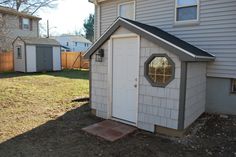
It's easy to transform the exterior of your home with a simple and inexpensive method. You can give new life to old siding. It is important to evaluate the condition of your house before you paint. Some exteriors are susceptible to wear, while others can be damaged by harsh weather. The cost to paint an exterior of your house depends on how big or small it is. Prices will also be affected by the quality and materials used.
The type of paint used to paint your exterior walls should be considered. This includes the sheen and color. A high-quality exterior paint will last for longer and come in richer colors. These paints are often labeled premium or super-premium. They're usually thicker and higher in pigment, which means they can cover larger surfaces and require fewer coats.

The type of siding your home has will also affect the cost of painting. Typically, wooden siding is cheaper to paint, while metal and concrete will cost more. The type of siding you choose will affect how often your exterior is painted. Concrete and brick will require more work to prepare, so they will need to be painted more often.
Preparation costs typically include power washing, scraping and priming. All of this preparation work will take approximately one hour per square feet. Professionals are needed to help with sloped or difficult-to reach areas. A permit and a qualified contractor will cost you $200-300. Painter's tape or protective sheets will also be required.
The size of your house will determine how much labor you need. A professional will charge between $25 and $100 per hour. A single-story house will typically cost $600 to paint, while a multi-story property will cost between $1500 and $2,000. Additional painting projects can increase the cost. If you live in an HCOL (High Cost of Living) area, you can expect to pay more for your exterior paint.
The price of exterior paint ranges from $20 to $60 per gallons. You can expect to pay $20-40 per gallon for an entry-level product while the highest quality paint will cost you between $50-$70 per gallon. A high-gloss finish can increase the price. A five-gallon bucket with a higher price tag can run up to $250.

You can use a laser measuring tool to determine the exact length and width of the surface you're working on. This will provide you with a better idea about the prep costs. This will help you estimate the cost of labor. The average house's exterior is around 20 feet tall and 20 feet wide, which makes it fairly easy to determine the number of hours required.
FAQ
Is there anything I can doto save money on my home renovation?
Doing the majority of the work yourself can help you save money. Consider reducing the number or people that you employ during renovations. You could also try to find ways to reduce the cost of materials used in the renovation process.
Are you able to live in a renovated house?
Yes, you can live in your house while you renovate it.
Can you live in a house and have renovations ongoing? The time taken to complete the work will impact the answer. If the renovation process lasts less than 2 months, then yes, you can live in your home while it's under construction. You can't live there if your renovation project takes more than two months.
The reason why you should not live in your home when there is a major construction project going on is because you might get hurt or even killed due to falling objects from the building site. You could also suffer from noise pollution and dust caused by the heavy machinery used on the job site.
This is especially true if you live in a multi-story house. The vibrations and sounds that construction workers create can cause damage to your property and contents.
As I mentioned before, while your home is being remodeled, you'll have to manage the inconveniences of living in temporary shelters. This means that your home won't provide all the amenities you need.
You won't be allowed to use your dryer or washing machine while they are being repaired. In addition to the unpleasant smells of chemicals and paint fumes, you will have to endure the noises made by workers.
All these factors can result in stress and anxiety within your family. You should plan ahead to avoid feeling overwhelmed by this situation.
It is important to research before you start renovating your house. This will help you avoid costly mistakes down the road.
You can also consider professional advice from a trusted contractor to ensure smooth running of your project.
What is the average time it takes to renovate a house?
It all depends upon the size of your project and how much time it takes. The average homeowner spends between three to six hours per week on the project.
Statistics
- According to the National Association of the Remodeling Industry's 2019 remodeling impact report , realtors estimate that homeowners can recover 59% of the cost of a complete kitchen renovation if they sell their home. (bhg.com)
- Most lenders will lend you up to 75% or 80% of the appraised value of your home, but some will go higher. (kiplinger.com)
- It is advisable, however, to have a contingency of 10–20 per cent to allow for the unexpected expenses that can arise when renovating older homes. (realhomes.com)
- ‘The potential added value of a loft conversion, which could create an extra bedroom and ensuite, could be as much as 20 per cent and 15 per cent for a garage conversion.' (realhomes.com)
- Rather, allot 10% to 15% for a contingency fund to pay for unexpected construction issues. (kiplinger.com)
External Links
How To
5 Things You Should Know Before Starting Your House Renovation
-
Do you really want this? - If you're going to start a major home improvement project like renovating your kitchen, bathroom or even building a new house, there's no doubt that you'll need some help along the way. However, if you feel unsure about your ability to complete such a big task by yourself, you might consider hiring someone to help you. It can take up your time and cost you money. You won't reap the benefits. Hire someone who knows the ropes to help you. They'll save you a lot of hassle and stress, and you'll still end up with a beautiful space to live in.
-
How much should I budget? - This one might seem obvious, but spending too much on a renovation project could actually make matters worse. The reason is because you'll probably find yourself having to pay back most of the costs at the end of the day. Keep your budget in mind. If you don't, you might end up spending a lot of money and not receiving anything.
-
Should I hire professional tradespeople or DIY? - There's no right and wrong answer. We recommend hiring professional tradespeople, however, if you're able to afford them. Their advice will be invaluable in helping you decide how to proceed. They'll install your plumbing correctly, provide a warranty, and ensure everything goes according to plan. DIY projects often involve a lot trial and error. You'll learn a lot the hard way. You'll also have to deal with any problems that may arise throughout the process.
-
How much can I afford it? - Do not underestimate how expensive a renovation project will cost. Even if the project seems manageable, it could prove costly and you will need to borrow money. When you want to sell your existing property quickly after the renovations are complete, you will need to account for the price of selling it.
-
Which place should I start? - When it comes to choosing where to start, there's no right or wrong place. However, we would suggest that you choose somewhere that you enjoy working on. That way, you'll be motivated to keep going, and you'll be less likely to procrastinate. Also, try to avoid places that require a lot of maintenance. You should avoid redecorating your living room if it is always covered in dirt and dust.